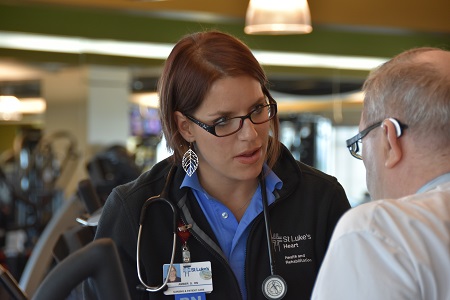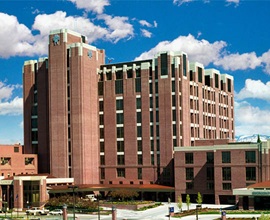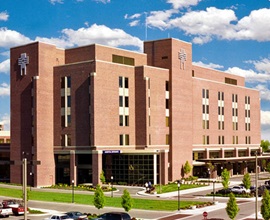St. Luke’s Named One of Nation’s Top 50 Cardiovascular Hospitals

Heart programs at St. Luke’s Meridian and Boise have received the 2018 Watson (Truven) Health Top 50 Cardiovascular Hospital Award for the 10th consecutive year. In addition to this distinction, St. Luke’s Heart is one of just seven organizations to receive the honor 12 times or more since the award was created in 1999.
The recognition speaks to St. Luke’s commitment to quality and better patient care, according to Dr. Stefanie Fry, St. Luke’s Heart executive medical director.
“Many programs specialize in one or two areas,” Dr. Fry said. “But we have been able to grow our niche across the board. The elements of these programs, year after year, allow us to improve and also improve what we offer to our patients.”
In the past 10 years the program has experienced significant growth, going from 10 cardiologists and two advanced practice providers to 19 cardiologists 17 advanced practice providers. Other achievements include:
- Developing a telemetry monitoring order set (a standardized list of evidence-based treatment guidelines) that matches criteria for cardiac monitoring established by the American Heart Association. This process reduces unnecessary testing in addition to saving money and limiting the additional work caused for nurses.
- Reducing unnecessary readmissions by expanding the Cardiac and Pulmonary Rehabilitation program, including increased bedside education at St. Luke’s Boise and Meridian and the addition of a dedicated respiratory therapist at each site.
- Introducing the Complete Health Improvement Program (CHIP) to help participants learn how to adapt a new plant-based nutrition plan, manage stress and increase exercise. The program can help patients lower blood cholesterol, hypertension and blood sugar levels in addition to helping patients with weight loss.
- Four of the St. Luke’s facilities in the Treasure Valley have been identified as Designated STEMI Referring or Receiving Centers by the Idaho Time Sensitive Emergency System. This builds on our partnership with local emergency medical services and other regional hospitals to provide better patient care when every second counts.
Programs developed within the past decade have helped serve specific patient populations and reduce unnecessary hospitalizations for those patients. Examples of those programs include the Heart Failure Clinic, Structural Heart Clinic, Cardiac and Pulmonary Rehab, and Care Transitions Program. There also has been specific work put into enhancing electrophysiology services to provide comprehensive care for patients with atrial fibrillation.
Many of the programs developed within St. Luke’s Heart are the result of strong physician leadership, said David Bishop, St. Luke’s Heart service line administrator.
“Physician leadership within these organizations is unique,” Bishop said. “We’ve had a real good run of physicians partnering and developing programs.”
Hospitals that received this award in 2018 shared the following characteristics (when compared to other cardiovascular programs):
- Significantly higher inpatient survival (21% to 47.4% higher)
- Fewer patients with complications (17.9% to 20.4% fewer)
- Higher 30-day survival rates for acute myocardial infarction (AMI), heart failure (HF), and coronary artery bypass grafting (CABG) patients (0.3 to 0.9 percentage points higher)*
- Lower readmission rates for AMI, HF, and CABG patients (0.6 to 0.9 percentage points lower)
- Average lengths of stay (ALOS) for CABG patients that were nearly one day lower than non-winners and 0.3 to 0.5 days lower for AMI, HF, and percutaneous coronary intervention (PCI)**
- $1,333 to $5,745 less in total costs per patient case (the smallest difference was for HF, and the largest was for CABG)
- Lower average 30-day episode of care payments for AMI and HF ($1,127 and $909 less per episode, respectively)
- If all cardiovascular hospitals performed at the level of this year’s winners:
- More than 8,900 additional lives could be saved
- Nearly 3,700 heart patients could be complication-free
- Over $1.4 billion could be saved
About The Author

Chereen Langrill was formerly a communications coordinator for St. Luke’s Health System.


